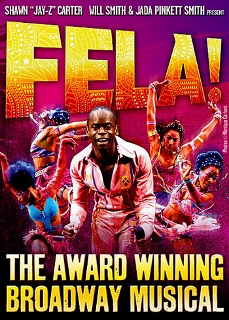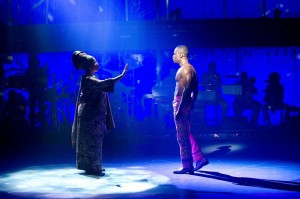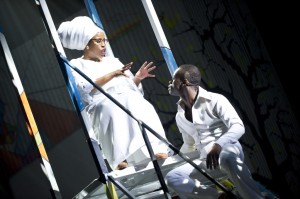ONE EXCLAMATION POINT IN THE TITLE
IS NOT ENOUGH
Audience enjoyment of Fela! at the Oriental Theatre will be in direct proportion to the viewer’s capacity to absorb more than two hours of non-stop high-energy music and dance. For some (probably most) patrons, the musical will be a continuous high of propulsive music and dancing. Others may be worn down by the final blackout, craving a more coherent story and less sensory assault.
Fela! is built around the biography of Fela Kuti, a Nigerian superstar singer, musician, and composer who became an iconic spokesman for the country’s underclass against the brutal and corrupt Nigerian military government in the 1970s and 80s. If the musical is to be believed, Fela was a man of limitless musical talent and equally limitless ego, but one who constantly risked his safety to oppose the vicious Nigerian rulers. He became a folk figure throughout Africa for his music and for his fearless support for the oppressed people of Nigeria.
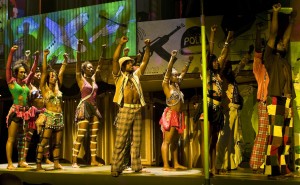
Fela is credited with popularizing a style of music called Afrobeat, a blend of traditional African chants and western jazz, soul, and rock. To me, Afrobeat sounds much like the Afro-Cuban jazz – the sort that Dizzy Gillespie’s big band was playing in the late 1940’s; but Fela, traveling with a large band and a company of singers, certainly gave the music massive international exposure.
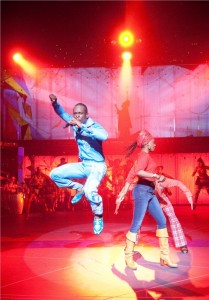 The musical is presented as Fela’s final performances in his nightclub, called the Shrine, in the Nigerian capital of Lagos. The first act has a floor show quality, with Fela presiding as master of ceremonies and performer. He sings, he dances, he plays a mean honking tenor saxophone, and he communicates directly with the theater audience, even rousing them to stand up and boogie to the powerful percussive rhythms of his on-stage band. The opening night audience rose on command and seemed to be jiving happily in time with the exuberance on the stage.
The musical is presented as Fela’s final performances in his nightclub, called the Shrine, in the Nigerian capital of Lagos. The first act has a floor show quality, with Fela presiding as master of ceremonies and performer. He sings, he dances, he plays a mean honking tenor saxophone, and he communicates directly with the theater audience, even rousing them to stand up and boogie to the powerful percussive rhythms of his on-stage band. The opening night audience rose on command and seemed to be jiving happily in time with the exuberance on the stage.
The second act gets darker. Through film and on stage narration the audience is exposed to the violence and cruelty of the Nigerian government. Fela’s mother dies from injuries after Nigerian soldiers throw her from the second story of the nightclub, leading to a long phantasmagorical scene in which Kuti is reunited with the spirit of his dead mother. Fela himself died in 1997 at the age of 58 but remains a figure of reverence in Africa and his many records are still hot sellers internationally.
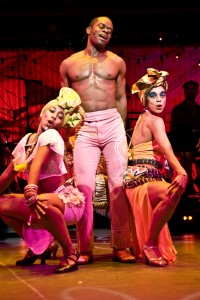 Although the touring production necessary scales back some of the spectacle of the Broadway version, the show at the Oriental Theatre does not lack for multi-media sizzle (film and projections by Peter Nigrini), dazzling lighting effects (Robert Wierzel), colorful costumes and sets (Marina Draghici), and leading the way, the wall-to-wall music dominated by the Fela songbook of original compositions (enhanced by Robert Kaplowitz’ sound design).
Although the touring production necessary scales back some of the spectacle of the Broadway version, the show at the Oriental Theatre does not lack for multi-media sizzle (film and projections by Peter Nigrini), dazzling lighting effects (Robert Wierzel), colorful costumes and sets (Marina Draghici), and leading the way, the wall-to-wall music dominated by the Fela songbook of original compositions (enhanced by Robert Kaplowitz’ sound design).
The ensemble consists of about two dozen performers but essentially this is a one-man show with a heroic performance by Sahr Ngaujah, the star of the Broadway production. Sahr makes his entry in a pastel blue jump suit and instantly grabs the show by the throat. Fela must have been an enormously charismatic figure and Sahr overflows with the stuff. He captures Fela’s genius as a musical figure as well as his brave (one could say foolhardy) assault on the Nigerian power structure as well as the international corporations that pillaged Nigerian resources with the complicity of the ruling generals.
If there is a Yoruba tribal word for chutzpah, Fela defined it. He had a limitless belief in the power of his music to change the world. Sahr captures Fela’s bravado and the bravery as well as his inexhaustible musical brilliance (though his sax solos are mimed while Morgan Price, part of the onstage band, does the actual playing). Just on stamina alone, Sahr’s performance is astonishing.
Although the Oriental stage is crowded with singers and dancers and musicians, there are only two supporting performers of significance: Melanie Marshall, who plays Fela’s mother, and Paulette Ivory, who plays a young woman named Sandra who is attached to Fela in some vague way. Both women sing beautifully, with Marshall’s long aria in the spirit reunion scene in the second act radiant in its vocal range and purity.
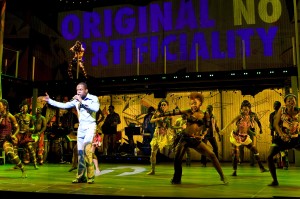
The rest of the ensemble delivers a continuous flow of African-inspired dances choreographed by Bill T. Jones (who also directs). The Jones choreography is virtually nonstop yet carries the feeling of a spontaneous and inevitable explosion of dance. There are a handful of solo dances of joyous virtuosity, mostly by Ismael Kouyate, Rasaan-Elijah Green, and Celan Lambert. But most of the dancing is performed by the ensemble with much booty shaking and dashing about, yet organic in its rhythmic motions and energy (the descriptive word that defines the entire enterprise).
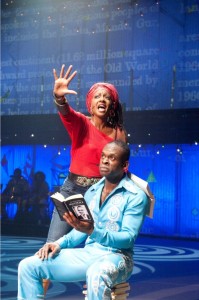 A dissenter might complain that the show is too long and that all the high velocity dancing and music validates the law of diminishing returns. The physical production team holds nothing back and the tsunami of multi-media effects occasionally is overpowering, leaving distracted viewers wondering where they are supposed to concentrate their attention. Also, the lack of a conventional storyline requires audience tolerance (Jones and Jim Lewis are credited with the unsteady book).
A dissenter might complain that the show is too long and that all the high velocity dancing and music validates the law of diminishing returns. The physical production team holds nothing back and the tsunami of multi-media effects occasionally is overpowering, leaving distracted viewers wondering where they are supposed to concentrate their attention. Also, the lack of a conventional storyline requires audience tolerance (Jones and Jim Lewis are credited with the unsteady book).
Whatever its defects, Fela! is still entertaining and informative. I suspect that few patrons will be familiar with Fela Kuti as they enter the theater. By the time they leave they will know and appreciate this remarkable personality in the equally remarkable portrait by Sahr Ngaujah. There are some emotional and disturbing moments in the second act when the brutality of the Nigerian government is exposed. But this outing will be most enticing to viewers who lock into the party time atmosphere of the show. That Afrobeat is pretty hard to resist.
{See Harvey Perr’s review of Fela! in Los Angeles.}
photos by Monique Carboni
Fela!
Oriental Theatre in Chicago
ends on April 15, 2012
for tickets, call 800 775 2000 or visit Broadway In Chicago
tour continues through June 17, 2012
for schedule, dates, and tickets, visit Fela
